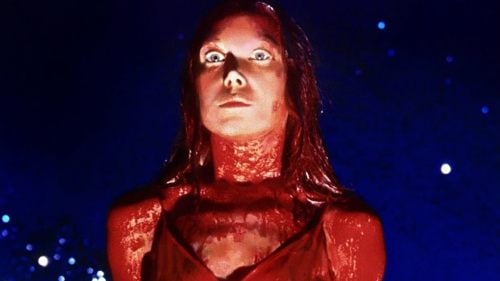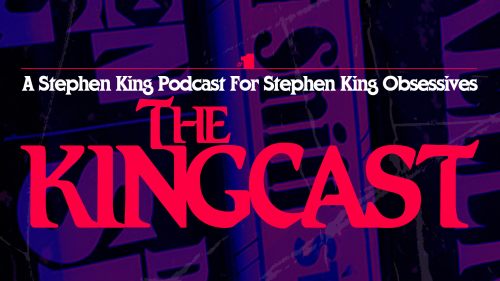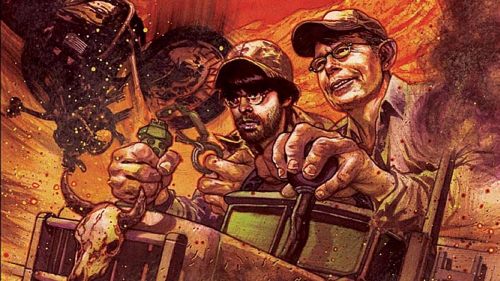The Mind Is Mighty And Terrible In THE DEAD ZONE
Shudder's Creepshow Presents Different Seasons: The Many Sides of Stephen King, an Alamo Drafthouse series of Stephen King screenings in anticipation of It Chapter Two. Click here to see the schedule and get tickets!
For a movie about a heroic psychic who tries to assassinate a maniacal politician who wants to unleash nuclear war, The Dead Zone is a surprisingly quiet film. This is especially true when compared to Stephen King and David Cronenberg’s previous stories about psychics. The title character of King’s Carrie obliterates her prom and subsequently decimates her town. The most sinister of Cronenberg’s Scanners makes his name by exploding a poor guy’s head, to say nothing of the picture’s visceral final battle. The Dead Zone is not without its share of carnage, but it is a decidedly lower-key affair than its older siblings. But just because nobody gets set on fire does not mean that The Dead Zone is some anonymous nothing of a movie. King and Cronenberg’s signatures can be found all throughout. They’re just using a different sort of ink. The Dead Zone is a striking, often unsettling character study that pits a fragile, good-hearted man (Christopher Walken’s Johnny Smith) against a power he is afraid will swallow him whole.
Johnny Smith has it rough from The Dead Zone’s start. Driving home after a wonderful date with his sweetheart Sarah (Brooke Adams), he is caught in a vicious car wreck and left comatose. When Johnny wakes up, five years have passed, and the world has turned. With physical therapy, he’ll be able to move, but not the way he could before the wreck. Sarah is extremely glad that he has woken up and still loves him, but she has also lived her own life. She’s married to a decent dude, and recently had a son. All of this would be a lot to process for anyone, but for Johnny it’s compounded by a newfound ability. When he touches someone, he sees things. Parts of their past they never knew. The ways their future might play out. How or why Johnny has acquired this power, he does not know. But it is real, and it is not going to go away.
Cronenberg renders Johnny’s power as overwhelming mentally and emotionally and paralyzing physically. Consider his very first vision:
Johnny is not in physical danger himself, but within his vision he can do nothing besides observe. The fact that his real bed is not catching on fire does not make the flames crawling up his vision bed any less distressing. And that is small potatoes next to watching a terrified young girl scream as the blaze surrounds her. Where Carrie White and Scanners’ titular psychics’ powers enabled them to impose their will on the world, Johnny’s power imposes the world on him. It’s a rush of information, frequently traumatic information, that pulls him away from reality without fully severing him from it.
Not only is Johnny’s power draining, it is isolating. Within it, he is helpless. Outside of it, he is alone. Those who care for him cannot understand what he experiences. Those who want something from him see the power long before they see him. When combined with the five-year gap between his life and the lives of everyone he loves, Johnny’s power leaves him feeling fundamentally detached from the world. And on some level, he welcomes this separation. To understand why, let’s dig into Walken’s performance.
Walken renders pre-wreck Johnny as a man thoroughly comfortable in his own skin. He loves reading the stories he teaches aloud, loves playing with the words that moved him to teach. The way he and Adams move around each other is affectionate and comfortable. After the wreck, the coma and the awakening of Johnny’s power, Walken does away with all of this. Johnny begins his post-coma life shakily and does not regain his old confidence until late into the film. He doesn’t just move more gingerly; he speaks with less confidence than before. As Johnny accumulates new traumas, Walken withers him. He’s never able to completely regain the ease he had with Sarah, even after they spend a day as lovers-that-could-have-been. Using his power, in particular on the recently deceased victim of a murder and sexual assault, leaves him pained and rigid. Johnny’s clothes, in particular his Count-Orlok-esque great coat, hang so heavy on Walken that he seems to shrink. At his lowest, he reads like a man teetering on the edge of a black hole. It’s a terrific lead performance, essential to The Dead Zone’s success.
Hurting and scared of his power though he is, and as mightily as he longs to vanish, Johnny cannot bring himself to stand by when he can help, even if the personal cost is immense. It is this deeply ingrained decency that leads Johnny to attempt to assassinate would-be-senator Greg Stillson (Martin Sheen) [OH MAN does that play weirdly now.] Johnny’s power is terrifying for the internal toll it takes on his mind and soul. The evil-minded and rotten-souled Stillson is terrifying for the power he could wield with high office. He is a man so certain of his own greatness and so heedless of others’ lives that, in Johnny’s vision, President Stillson announces to his aghast cabinet members that he’s started a nuclear war with a gleeful “Hallelujah, Hallelujah!” Sheen hammers Stillson’s wickedness home with mile-a-minute glad-handery and relentless, charging physicality – an effective foil to Walken’s brittle weariness. Cronenberg’s climax takes full advantage of Walken and Sheen’s work by reversing their positions. Johnny is decisive and confident, even when he’s mortally wounded. Stillson, in a panic, exposes himself as a despicable coward and is reduced to enraged, hapless flailing.
Johnny never masters his power in that way that Scanners’ Vale does. But for all the terror it brings him, and for all that he longs for the life he lost in the wreck, Johnny ultimately succeeds in accepting, understanding and finding a way to act on it. After struggling for so long with the fear that he was a man fundamentally walled off from the world, Johnny succeeds in making a real, tangible difference for the better. He dies in the attempt, but he dies at peace. And for someone whom peace had so long seemed impossible, that is no small thing.



